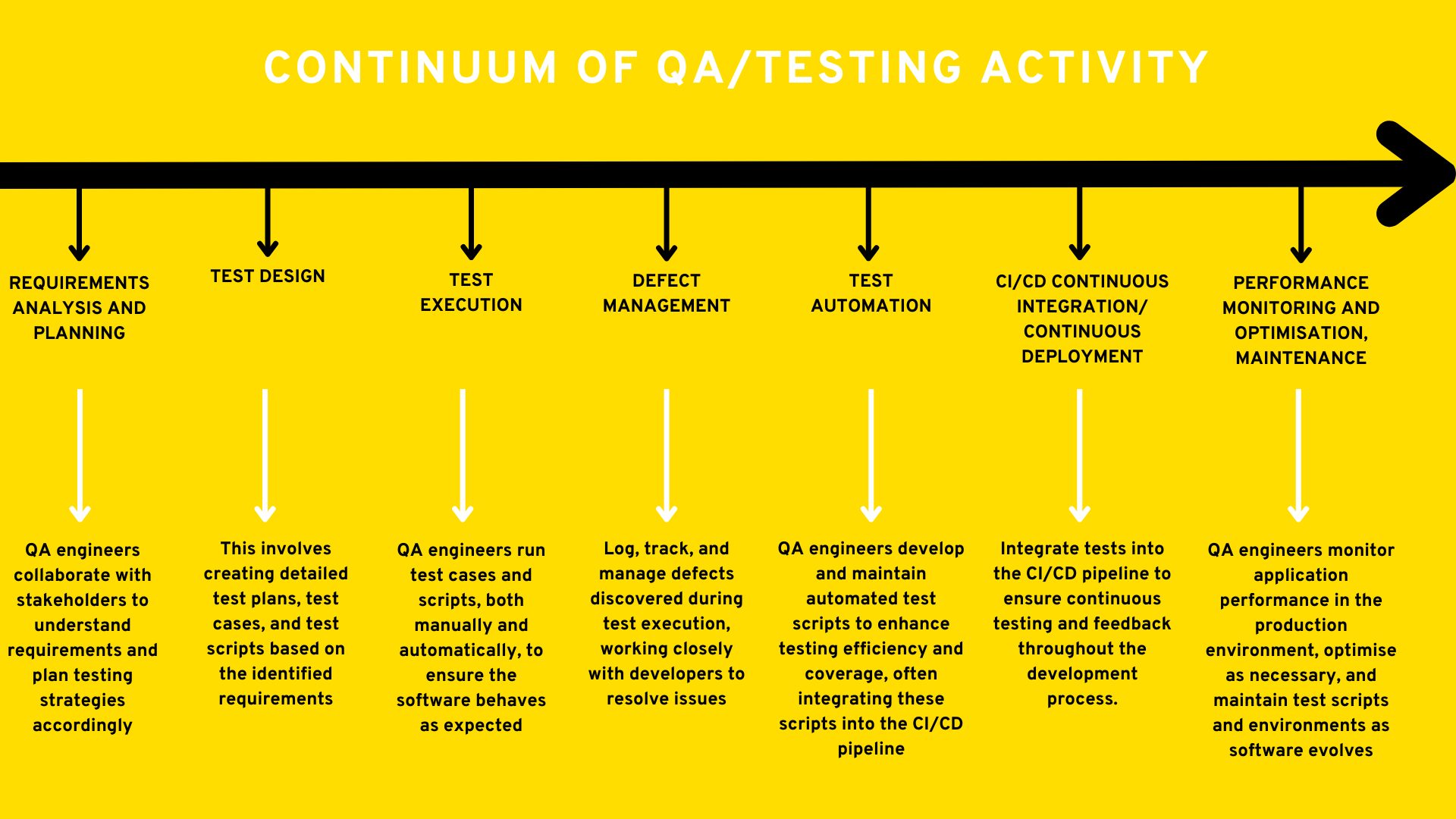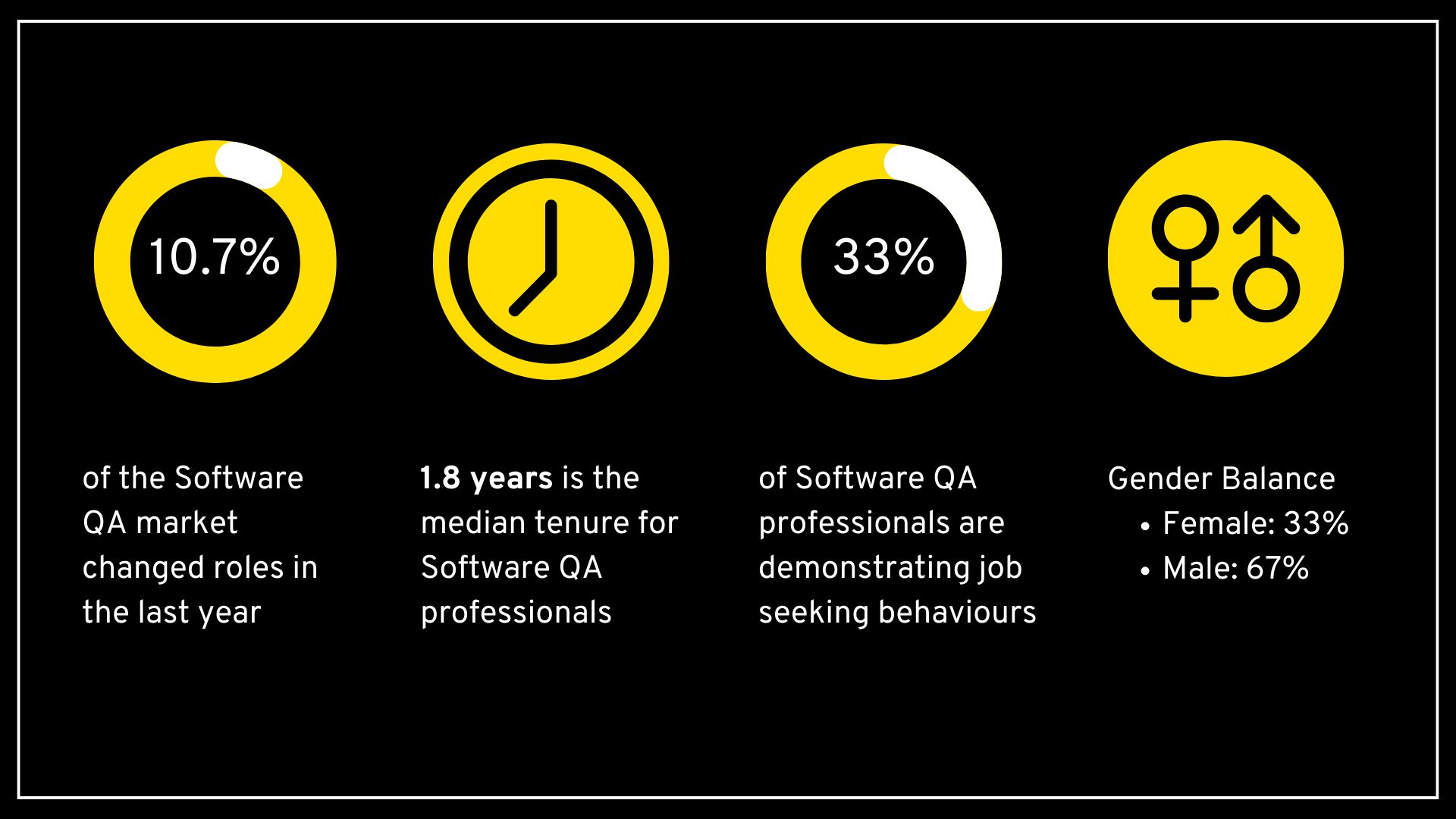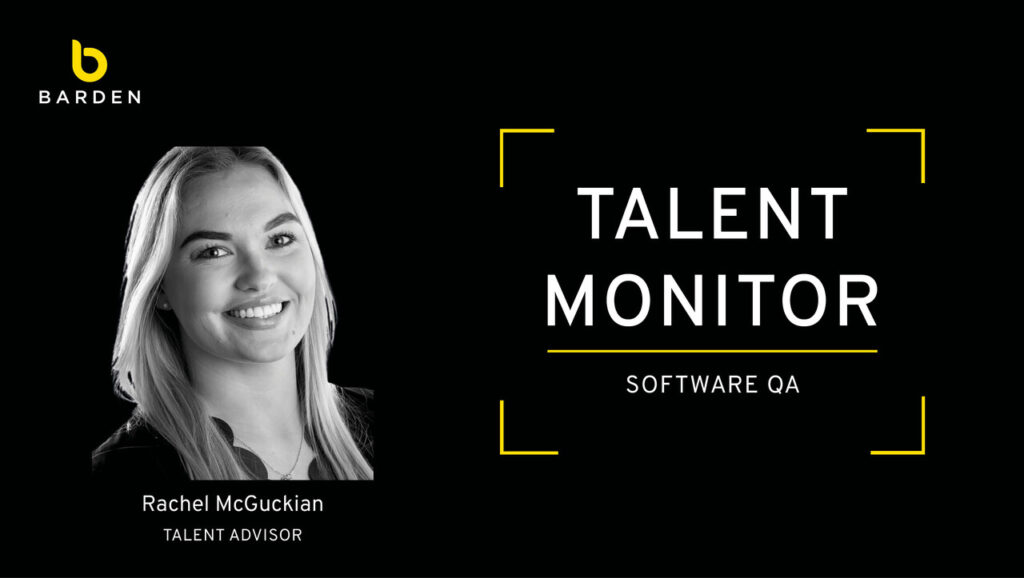In the ever-evolving software development landscape, Quality Assurance (QA) is a vital component embedded in every phase of the Software Development Life Cycle (SDLC). Ensuring the reliability, functionality, and excellence of software products, QA is fundamental to successful software engineering.
Ireland has emerged as a prominent tech hub, attracting multinational corporations due to its supportive innovation ecosystem. This influx has also sparked the development of indigenous startups. Amidst this growth, the software QA role has become increasingly important, ensuring that both multinational and homegrown companies deliver reliable, high-quality software products.
After engaging with a diverse group of software testers, let’s explore some key insights, emerging trends, and important factors in the industry.
#1 Software QA Landscape
The continuum of work for a QA engineer reflects the balance of activities they engage in throughout the SDLC. This balance can vary significantly from one company to another. For instance, in some organisations, QA engineers may take on broader responsibilities including leadership and managerial duties, whereas in larger multinational companies, their roles may be more specialised.
Here are the key points that outline this continuum:

Understanding this continuum of testing activity is essential, as it illustrates the varied and complex nature of the QA engineer’s role. It emphasises the importance of context when discussing roles and corresponding salaries.
#2 Variables
Job titles in software QA and test automation can be misleading without context. They don’t fully define your role or market value. Several key factors influence a QA tester’s value, highlighting the role’s scope and the diversity of experience. Here are the ones that tend to matter the most:
- Team and Company Size:
In smaller teams within local companies, individuals often have wider responsibilities across various testing domains. For instance, in a multinational corporation, a QA Engineer might specialise in performance testing for a specific product line. Conversely, in a startup environment, the same role could involve overseeing performance, security, and usability testing across all company products.
Similarly, the responsibilities of test leads expand in larger teams. As they manage and mentor more engineers, their leadership and oversight duties increase significantly.
Another point to consider here is that QA teams collaborate closely with developers, product managers, and other stakeholders. Effective communication and teamwork lead to better outcomes and provide valuable exposure to cross-functional dynamics.
- Scope of Responsibilities:
Roles evolve with experience and seniority. Junior and senior QA engineers typically focus on hands-on testing tasks, while those at lead levels are expected to bring leadership and strategic oversight to testing initiatives. Companies value QA engineers who can navigate both technical intricacies and project management challenges.
Consider a senior QA engineer transitioning to a lead role. Their market value increases not just because of technical proficiency but also due to their ability to steer testing efforts across complex projects.
- Project Complexity and Automation:
The complexity of projects dictates the testing strategies needed. Larger and more intricate projects require sophisticated approaches, including robust automation frameworks. Automated testing tool suites used in QA are complex, so automated testers are often skilled in a limited set of them. Proficiency in tools like Selenium, Appium, Jenkins, and TestNG is highly valued, as these tools streamline testing processes and ensure scalability.
For example, a QA engineer adept in automation frameworks might lead the implementation of a comprehensive test suite for a new feature rollout in a major software release. In contrast, individuals primarily experienced in manual testing may face more restricted job opportunities, given the growing prominence of automation in the industry.
- Cloud Technologies and Testing:
Cloud platforms offer scalable and flexible testing environments that are integral to modern QA practices. Familiarity with popular cloud providers such as AWS, Azure, and Google Cloud, along with expertise in cloud-specific testing such as API and microservices testing, enhances a QA engineer’s versatility and value.
Imagine a QA engineer specialising in cloud testing for a SaaS company. Their proficiency in API testing on AWS Lambda or Azure Functions ensures seamless integration and functionality across distributed systems.
- Web and Mobile Application Testing:
Versatility across different platforms—web and mobile—significantly enhances a QA engineer’s adaptability. Companies seek professionals who can navigate the nuances of testing on various devices and operating systems.
For instance, a QA engineer experienced in cross-platform testing might oversee the launch of a new mobile app, ensuring it performs flawlessly across iOS and Android devices.
In summary, a QA professional’s worth in the market is shaped by their ability to navigate these variables effectively. Proficiency in automation, cloud technologies, and diverse testing environments not only broadens their scope but also positions them as invaluable assets capable of driving quality and innovation within their organisations.
#3 Base Salary
In this article, we have not used specific base salary ranges due to the multitude of variables discussed in #2. Understanding the context and specific variables is important, as using salary ranges without this information would be misleading. Salaries vary significantly based on expertise and what the company in question needs.
Those with advanced skills in automation, mobile, or cloud testing are typically highly sought-after by companies. In summary, without a clear understanding of these factors and where a role falls on the continuum, any given salary range associated with job titles wouldn’t be accurate.
Here’s an example of some recently delivered assignments:
- MNC – Cork – QA Manager: €100,000 – €110,000
- MNC – Dublin – Software Test Lead: €95,000 – €110,000
- MNC – Dublin – Senior QA Automation Engineer: €90,000 – €95,000
- Tech Startup – Dublin – Senior QA Automation Engineer: €80,000 – €90,000
- MNC – Dublin – QA Engineer (manual & automation): €65,000 – €75,000
- MNC – Munster – Manual Tester (Mobile Apps): €55,000 – €60,000
- Small Fintech Company – Cork – Junior Software Tester: €36,000 – €40,000
If you would like to discuss a salary range bespoke to your role and location, simply contact Rachel at rachel.mcguckian@barden.ie to chat in more detail.
#4 Current Snapshot of the Software QA Talent Pool
Here’s what we’ve noticed this quarter in the Software QA talent pool in Ireland:

#5 What are the key considerations for companies in 2025?
- What are QA Leaders doing? In 2025, QA leaders are navigating the shift back to hybrid working by embracing a blend of flexibility and structure. While some mandatory in-office days are becoming the norm, hiring managers are offering other flexible arrangements, such as adaptable working hours or fewer office days each week. This approach allows companies to attract talent from across Ireland and even internationally, broadening their talent pool.
- Automation Impact and Continuous Learning: QA engineers must continuously upskill in emerging technologies related to automation to stay relevant. Staying updated with industry trends, tools, and methodologies is crucial for maintaining effectiveness in their roles. Automation frameworks and tools are becoming increasingly essential for streamlining testing processes, enhancing efficiency, and improving test coverage.
- Navigating the AI Frontier: The landscape for QA engineers is rapidly evolving with the emergence of AI. As software increasingly incorporates AI components, QA testers face unique challenges. There will be a strong focus on upskilling in AI and machine learning, understanding common algorithms, and collaborating with data science teams. By embracing these changes, QA testers can ensure robust testing of AI components.
- Skill Development and Knowledge Sharing: The demand for QA engineers in Ireland remains strong, and leading companies should consider hiring engineers who can be upskilled in automation tools and other areas. Facilitating knowledge transfer from experienced team members to new hires ensures the company doesn’t miss out on top talent simply due to a lack of specific tool experience. A strong engineer demonstrates a proven ability to adapt to evolving technologies throughout their career, seamlessly transitioning between different companies and toolsets. There’s every reason to believe they can do the same in this new role.
- Data-Driven Recruitment Strategies for Software Testers: The use of data analytics and AI in recruitment is becoming increasingly popular. Companies are leveraging predictive analytics to find software testers who best fit their organisational culture and specific testing requirements. This data-driven approach streamlines hiring decisions and enhances recruitment outcomes. QA engineers seeking new opportunities should optimise their LinkedIn profiles, highlighting their experience with specific tools to appear in relevant keyword searches.
In Barden, we understand that each team, role, and requirement is unique. If you would like to discuss what tactics and approaches that would suit you, please feel free to contact Rachel McGuckian our Software QA Talent Advisory & Recruitment expert here in Barden (rachel.mcguckian@barden.ie); we’re where leaders go before they start looking for Software QA talent.
This information is accurate as per January 2025 and will be updated periodically. Data sources include Barden Proprietary Data, LinkedIn Analytics and other 3rd party data sources. If you have a request and would like real-time information to inform your hiring decisions contact Rachel McGuckian at rachel.mcguckian@barden.ie


 Jump Back
Jump Back

